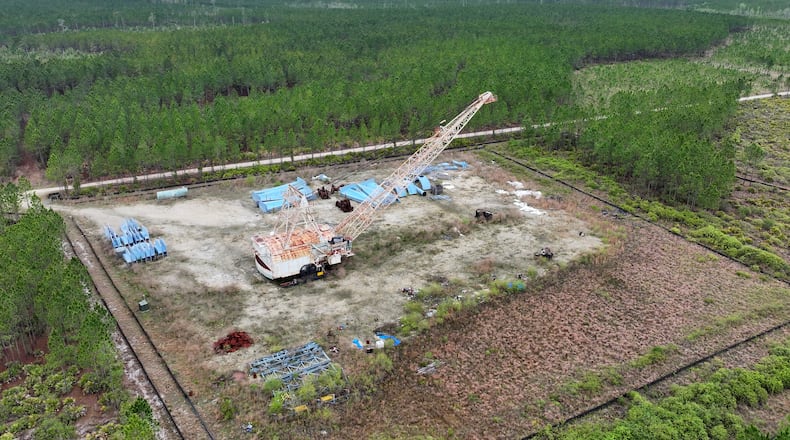Twin Pines Minerals has not produced the $2 million bond or other collateral required to receive its permit to mine titanium near the Okefenokee Swamp, a delay that comes as the company and its affiliates continue to show signs of financial distress.
Georgia Environmental Protection Division spokeswoman Sara Lips confirmed on Wednesday that Twin Pines has yet to submit the financial assurance required for permit approval. The agency requested a bond or other collateral from the company in February 2024, shortly after draft permits were released.
Georgia law requires that mining operators put up financial assurance to ensure land restoration after mining is completed.
The news of the delay comes as Twin Pines and several of its executives and affiliates are facing a pair of lawsuits from companies that allege they’re owed millions in unpaid services. The Atlanta Journal-Constitution has also chronicled struggles the company has faced in paying its property taxes in South Georgia.
Twin Pines says the $300 million mine project would employ hundreds of full-time workers and double the county’s tax base. These commitments have helped the company garner strong support from Charlton County public officials, who say the additional tax dollars can be used to fund essential public services.
But the company’s apparent financial struggles have cast doubt on those promises, says Southern Environmental Law Center attorney Peter Slag.
Environmental groups and other opponents have long argued the mine would endanger the swamp’s fragile and important ecosystem. Many had feared permitting would happen shortly after draft permits were released nearly 16 months ago.
“The fact that Twin Pines hasn’t or can’t come up with this amount of money shows they aren’t a responsible actor and aren’t serious about doing this project responsibly,” Slag said.
Twin Pines declined to comment when asked by the AJC why the company has not paid the financial assurance.
In March, a federal court in Colorado entered a default judgment against Twin Pines in a case brought by a Danish shipping company that alleges it is owed $9.4 million in unpaid services, interest and attorneys fees, court records show. The case is now stayed pending arbitration.
In a lawsuit filed in a California state court that same month, M&L Commodities alleges Twin Pines and Trail Ridge Land LLC, an affiliated company that owns the roughly 600 acres of land where the mine would be built, have been “financially insolvent” for at least the past two years.
The lawsuit alleges they are shell companies that exist to evade creditors. Both companies are affiliated with Greenfuels Energy LLC, which is also named as a defendant.
The dispute centers on a contract Twin Pines struck with M&L Commodities in August 2021 for the storage of thousands of tons of mineral sand in California. M&L’s attorney alleges that, after years of timely payment, Twin Pines began falling behind in early 2023.
By June 2024, Twin Pines’ outstanding invoices ballooned to $4.2 million, according to the lawsuit.
Twin Pines President Steven Ingle struck a deal last August that converted the outstanding balance into a $3 million loan in exchange for over $1 million in debt forgiveness.
But unpaid invoices continued to pile up in the months following the deal. By February, Twin Pines accrued an additional $2.7 million in debt to M&L Commodities, according to the complaint.
M&L Commodities filed suit in March, demanding a total payment of roughly $5.7 million — the sum of the loan and remaining unpaid invoices — and accusing Twin Pines and other defendants of fraud and unjust enrichment, court records show.
“Defendants have since engaged in an unlawful pattern and practice of making false representations and financial assurances,” the complaint says.
In a legal answer filed with the court in late April, Twin Pines denied “each and every allegation.” The company on Wednesday declined the AJC’s request for an interview.
“Twin Pines cannot comment because these are pending legal matters,” said Joseph Martinez, the attorney representing the company.
Twin Pines previously operated a mine in Ione, California, which was cited by state regulators in September 2023 for operating without a permit.
Credit: HYOSUB SHIN / AJC
Credit: HYOSUB SHIN / AJC
Ingle told the AJC last year Twin Pines sold the Ione facility and no longer works the site. It is unclear whether M&L Commodities’ work for Twin Pines was related to the Ione facility. An attorney for the California-based company did not respond to a request for comment.
The lawsuits come months after The Atlanta Journal-Constitution reported that Twin Pines fell behind on a $650,000 personal property tax bill in Charlton County in South Georgia, where the mining equipment was kept.
The tax bill has since been paid, Charlton County tax records show. But Trail Ridge has four outstanding liens for roughly $30,000 in unpaid taxes.
North Carolina Renewable Power, another Greenfuels subsidiary, was repeatedly late on property taxes it owed on a now-shuttered biomass energy plant in North Carolina. Ingle served as vice president of engineering for that company for several years.
That project was also the subject of roughly $170,000 in fines across 64 violations cited by North Carolina environmental regulators, a previous AJC investigation found.
Twin Pines itself was fined $20,000 last year by Georgia regulators for drilling on the proposed swamp mining site without the supervision of a state licensed geologist or professional engineer, state records show.
Our Reporting
We’ve had multiple reporters following the saga of the titanium mine proposal in South Georgia near the Okefenokee Swamp. We’ve covered the environmental record in multiple states of the company pushing the mine proposal and closely followed the state permitting process. Today’s story examines the financial struggles facing the company and its failure to file necessary financial assurances to obtain a state permit to operate the mine.
About the Author
Keep Reading
The Latest
Featured





